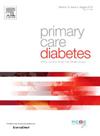Targeting depression and diabetes comorbidity: A generalization meta-analysis of randomized controlled trials on cognitive-behavioural therapy efficacy
IF 2.6
4区 医学
Q3 ENDOCRINOLOGY & METABOLISM
引用次数: 0
Abstract
Aims
This study evaluated the effectiveness of cognitive-behavioural therapy (CBT) in managing comorbid depression and diabetes by examining its influence on psychological and metabolic outcomes, addressing inconsistencies in existing research.
Methods
A systematic review of 26 randomized controlled trials (RCTs) involving 4220 participants conducted between 2000 and 2024 was performed. Subgroup analyses evaluated geographic location, delivery modes, and intervention characteristics, including session duration and frequency.
Results
CBT significantly reduced depressive symptoms (SMD = –1.30, 95 % CI –2.46 to –0.13, p < 0.05), demonstrating substantial psychological benefits. Its effect on glycemic control, measured by HbA1c levels, was modest and not statistically significant (SMD = –0.56, 95 % CI –1.12–0.01, p > 0.05). Subgroup analyses revealed variations based on region and intervention characteristics. High heterogeneity across studies highlighted the need for tailored approaches that consider context-specific factors and delivery methods.
Conclusions
CBT effectively reduces depressive symptoms in individuals with diabetes, supporting its role in integrated care models. However, its association with glycemic control remains inconclusive. Future research should refine CBT protocols to enhance both psychological and metabolic outcomes while addressing diverse needs.
针对抑郁症和糖尿病合并症:认知行为疗法疗效随机对照试验的综合荟萃分析。
目的:本研究通过检查认知行为疗法(CBT)对心理和代谢结果的影响来评估CBT在治疗抑郁症和糖尿病共病中的有效性,解决现有研究中的不一致之处。方法:系统回顾2000年至2024年间进行的26项随机对照试验(RCTs),涉及4220名受试者。亚组分析评估了地理位置、交付模式和干预特征,包括疗程持续时间和频率。方法:系统回顾2000年至2024年26项随机对照试验(RCTs),涉及4220名受试者....分组分析评估了地理位置、交付模式和干预特征,如疗程持续时间和频率。结果:CBT显著减轻抑郁症状(SMD = -1.30, 95 % CI -2.46 ~ -0.13, p 0.05)。亚组分析揭示了基于区域和干预特征的差异。研究之间的高度异质性突出了考虑具体情况因素和交付方法的量身定制方法的必要性。结论:CBT可有效减轻糖尿病患者的抑郁症状,支持其在综合护理模式中的作用。然而,其与血糖控制的关系仍不确定。未来的研究应完善CBT方案,以提高心理和代谢结果,同时满足不同的需求。
本文章由计算机程序翻译,如有差异,请以英文原文为准。
求助全文
约1分钟内获得全文
求助全文
来源期刊

Primary Care Diabetes
ENDOCRINOLOGY & METABOLISM-PRIMARY HEALTH CARE
CiteScore
5.00
自引率
3.40%
发文量
134
审稿时长
47 days
期刊介绍:
The journal publishes original research articles and high quality reviews in the fields of clinical care, diabetes education, nutrition, health services, psychosocial research and epidemiology and other areas as far as is relevant for diabetology in a primary-care setting. The purpose of the journal is to encourage interdisciplinary research and discussion between all those who are involved in primary diabetes care on an international level. The Journal also publishes news and articles concerning the policies and activities of Primary Care Diabetes Europe and reflects the society''s aim of improving the care for people with diabetes mellitus within the primary-care setting.
 求助内容:
求助内容: 应助结果提醒方式:
应助结果提醒方式:


